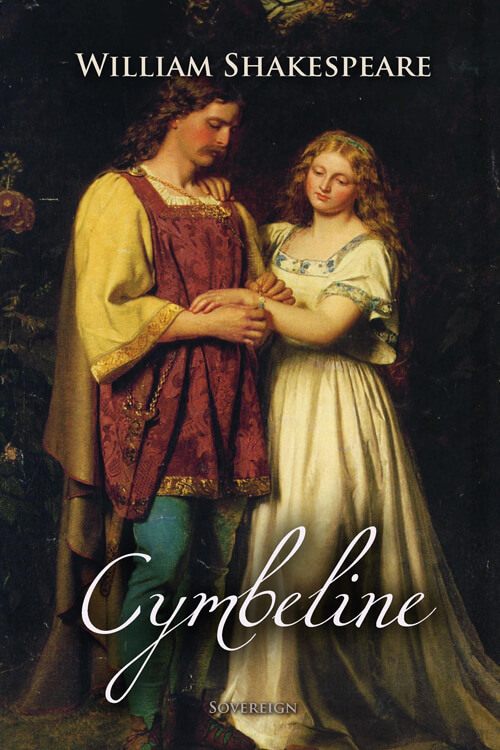
Cymbeline
EGEUS. Full of vexation come I, with the complaint
Against my child, my daughter Hermia.
Stand forth, Demetrius. My noble lord,
This man hath my consent to marry her.
Stand forth, Lysander. And, my gracious Duke,
This man hath bewitched the bosom of my child.
Thou, thou, Lysander, thou hast given her rhymes,
And interchanged love-tokens with my child;
Thou hast by moonlight at her window sung,
With feigning voice, verses of feigning love,
And stealing the impression of her fantasy
With bracelets of thy hair, rings, gauds, conceits,
Knacks, trifles, nosegays, sweetmeats- messengers
Of strong prevailing in unhardened youth;
With cunning hast thou filched my daughter’s heart;
Turn’d her obedience, which is due to me,
To stubborn harshness. And, my gracious Duke,
Be it so she will not here before your Grace
Consent to marry with Demetrius,
I beg the ancient privilege of Athens:
As she is mine I may dispose of her;
Which shall be either to this gentleman
Or to her death, according to our law
Immediately provided in that case.
THESEUS. What say you, Hermia? Be advised, fair maid.
To you, your father should be a god;
One that composed your beauties; yea, and one whom you are but as a form in wax,
By him imprinted, and within his power
To leave the figure, or disfigure it.
Demetrius is a worthy gentleman.
HERMIA. So is Lysander.
THESEUS. In himself he is;
But, in this kind, wanting your father’s voice,
The other must be held the worthier.
HERMIA. I would my father looked but with my eyes.
THESEUS. Rather your eyes must with his judgment look.
HERMIA. I do entreat your Grace to pardon me.
I know not by what power I am made bold,
Nor how it may concern my modesty
In such a presence here to plead my thoughts;
But I beseech your Grace that I may know
The worst that may befall me in this case,
If I refuse to wed Demetrius.
THESEUS. Either to die the death, or to abjure
For ever the society of men.
Therefore, fair Hermia, question your desires,
Know of your youth, examine well your blood,
Whether, if you yield not to your father’s choice,
You can endure the livery of a nun,
For aye to be shady cloister mewed,
To live a barren sister all your life,
Chanting faint hymns to the cold fruitless moon.
Read or download Book
William Shakespeare
William Shakespeare (April 1564 – 23 April 1616) was an English playwright, poet, and actor. He is widely regarded as the greatest writer in the English language and the world’s pre-eminent dramatist. He is often called England’s national poet and the “Bard of Avon” (or simply “the Bard”). His extant works, including collaborations, consist of some 39 plays, 154 sonnets, three long narrative poems, and a few other verses, some of uncertain authorship.
Biography.
His plays have been translated into every major living language and are performed more often than those of any other playwright. Shakespeare remains arguably the most influential writer in the English language, and his works continue to be studied and reinterpreted. Shakespeare was born and raised in Stratford-upon-Avon, Warwickshire. At the age of 18, he married Anne Hathaway, with whom he had three children: Susanna, and twins Hamnet and Judith. Sometime between 1585 and 1592, he began a successful career in London as an actor, writer, and part-owner (sharer) of a playing company called the Lord Chamberlain’s Men, later known as the King’s Men. At age 49 (around 1613), he appears to have retired to Stratford, where he died three years later. Few records of Shakespeare’s private life survive; this has stimulated considerable speculation about such matters as his physical appearance, his sexuality, his religious beliefs, and whether the works attributed to him were written by others. Shakespeare produced most of his known works between 1589 and 1613. His early plays were primarily comedies and histories and are regarded as some of the best works produced in these genres. He then wrote mainly tragedies until 1608, among them Hamlet, Romeo and Juliet, Othello, King Lear, and Macbeth, all considered to be among the finest works in the English language.
In the last phase of his life, he wrote tragicomedies (also known as romances) and collaborated with other playwrights. Many of Shakespeare’s plays were published in editions of varying quality and accuracy during his lifetime. However, in 1623, John Heminges and Henry Condell, two fellow actors and friends of Shakespeare’s, published a more definitive text known as the First Folio, a posthumous collected edition of Shakespeare’s dramatic works that includes 36 of his plays. Its Preface was a prescient poem by Ben Jonson, a former rival of Shakespeare, that hailed Shakespeare with the now famous epithet: “not of an age, but for all time”.






